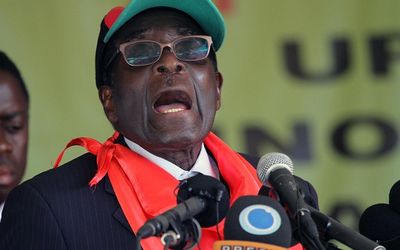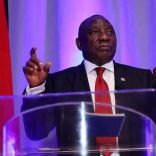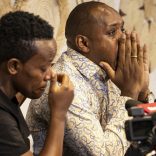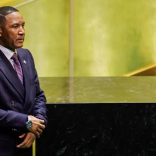South Africa's Ramaphosa removes police minister over criminal link allegations
Fault lines develop in Zimbabwe’s army

Sunday Times / Zimbabwean President Robert Mugabe
Zimbabwe’s military is fracturing along generational lines in a potentially dangerous turn for the Southern African nation as President Robert Mugabe’s ruling party splits over who will succeed him.
With Mugabe approaching his 93rd birthday and Zimbabwe’s economy imploding, some top military leaders were choosing sides in faction fights of the ruling Zanu (PF), said four members of the party’s politburo who spoke on condition of anonymity.
Veterans of the independence war against the white-minority state of Rhodesia mainly backed Vice-President Emmerson Mnangagwa against Mugabe’s wife, Grace Mugabe, they said.
The splits threaten the cohesion of a military that has been a pillar of Mugabe’s power base since the armed struggle that led to independence in 1980. With rising protests over an economy that has halved in size since 2000, who senior army commanders support in the ruling party may determine the country’s next president.
“The generals are involved in a war of generations,” said Alex Magaisa, a UK-based law lecturer and one of the authors of Zimbabwe’s 2013 constitution. “The liberation generation wants to hold on to power against the post-liberation generation, which wants to wrest control of the party leadership.”
Faction fight
Gen Constantine Chiwenga, the 60-year-old commander of the Zimbabwe Defence Forces, supports Mnangagwa, who has served in Mugabe’s cabinet since independence. Maj-Gen Douglas Nyiakaramba, chief of administration, is backing a faction that has coalesced around Grace Mugabe.
Army commander Gen Philip Sibanda, who once led UN peacekeeping forces in Angola, had stayed out of the dispute, they said. The three officers were not available to comment, a telephone operator, who refused to provide his name, said on Wednesday when Bloomberg called army headquarters.
The Zimbabwe National Liberation War Veterans Association, once used to subdue opposition protests and spearhead policies such as the seizure of white-owned commercial farms, criticised Mugabe in July, saying he “presided over untold suffering of the general population for his own personal aggrandisement and that of his cronies.”
Former vice-president Joice Mujuru, who was expelled from Zanu (PF) two years ago and now leads the Zimbabwe People First party, still enjoys sympathy among officers. She is the widow of former defence forces commander Solomon Mujuru, who died in a house fire five years ago. Joice Mujuru says the general, a hero to most Zimbabweans, was assassinated.
Mnangagwa, a 69-year-old former security minister, heads a faction in the ruling party known as Lacoste, taken from the French sportswear firm Lacoste’s logo, a crocodile, Mnangagwa’s nickname. Opposing it is a group known as Generation-40 [G-40], who are made up of generally younger supporters of 51-year-old Grace Mugabe, who critics call “Gucci Grace” for her allegedly extravagant lifestyle.
Older leaders
“G-40 is more civilian orientated; the generals look to older party leaders who actually carried guns in the war for the main part,” said Showers Mawowa, a Zimbabwean researcher at the Southern African Liaison Office in Pretoria.
“Zanu (PF) has a history of military involvement in politics dating back to the 1970s that has never disappeared.”
Mugabe has faced increased protests in recent months as an unprecedented liquidity crisis has led to civil servants, including military officers and troops, receiving salaries late and some private-sector workers being given goods instead of pay. That sparked a national strike on July 6 that shut down much of Zimbabwe. The country was also hit by riots as taxi operators protested against police harassment.
Freer atmosphere
“It seems that across the security sector, including the police, there’s less inclination to clamp down on protest,” Mawowa said. “The atmosphere is much more open now, even in the rural areas people aren’t as afraid of Zanu (PF) as they were.”
The older generation of officers would probably stick with the Mnangagwa faction because they have seen how Grace Mugabe’s supporters orchestrated the expulsion of Mujuru, a war veteran, from the ruling party, Magaisa said.
“The generals are looking to their future; they know they’ll soon leave active duty and must prepare for life after it,” he said. “They’ve also seen how the G-40 approach is built around the erosion of the older war generation.”













Leave a Reply
Be the First to Comment!
You must be logged in to post a comment.
You must be logged in to post a comment.